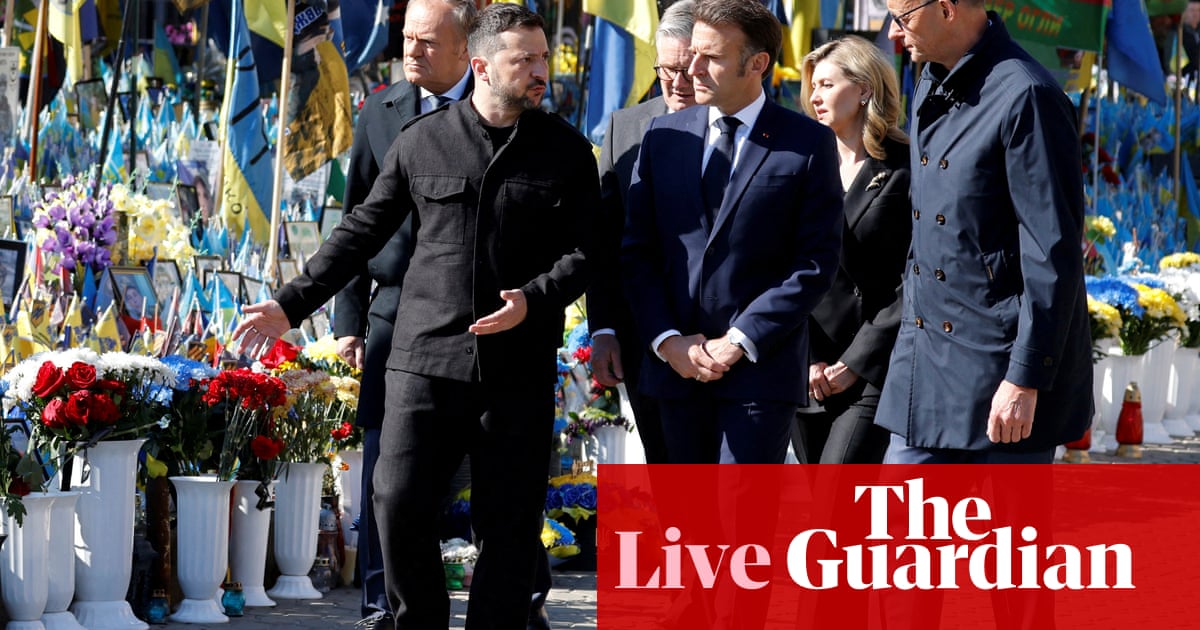It isEmmanuel Macron’s first visit toKyivsince summer 2022, and the first visit as chancellor forFriedrich Merz, who only took office this week.
The four European leaders visited Kyiv’sMaidanon Saturday morning, together withVolodymyr Zelenskyyand his wife. Thousands of flags have been planted in the central square, to remember those who have been killed in the war withRussia. The leaders paid their respects and had a moment of silence, before heading to talks with Zelenskyy.
Later,Downing Streetsaid the five would beam into a virtual meeting to update other leaders on progress being made for a so-called “air, land, maritime and regeneration force” that is planned to be part of a peace deal.
FrenchpresidentEmmanuel Macroncalled on Saturday for “direct talks” betweenUkraineandRussiain the event of a ceasefire inMoscow’s three-year invasion, reports Agence France-Presse (AFP).
If there is a 30-day truce, as western countries have floated, “we will look to direct talks between Ukraine andRussia, we are ready to help,” Macron said in an interview with French news outlets TF1 and LCI while travelling toKyivto meetEuropeanleaders.
Saturday’s visit toKyivis likely to focus more on finding a common western position onUkraineto take toDonald Trump, asEuropeanleaders try their best to keep the US onside. The Trump administration has so far appeared to be much tougher on Kyiv thanMoscow, but there are some small signals that the mood inWashingtonmight be changing, after a positive meeting between Trump andZelenskyyin theVaticanon the sidelines of the pope’s funeral.
Even vice-presidentJD Vance, seen as the most sceptical of voices on support for Ukraine,has criticised Moscow’s stancein recent days. “Right now, the Russians are asking for a certain set of requirements, a certain set of concessions in order to end the conflict. We think they’re asking for too much,” he said earlier in the week.
Trump was asked by reporters in theOval Officeif he had a message forPutinon Friday, after theUS embassyhad released its air attack warning. “I have a message for both parties: Get this war ended,” he said, adding: “Get this stupid war finished. That’s my message for both of them.”
The leaders of theUK,France,GermanyandPolandhave arrived inKyivfor a symbolic visit toUkraine,one day afterVladimir Putinhosted a set-piece military parade onRed Square. The visit comes as theUSwarned of intelligence about a big impending air attack on Ukraine.
Keir Starmer,Emmanuel MacronandFriedrich Merzarrived in Kyiv on the same train on Saturday morning, whileDonald Tusktravelled on a separate train. The four leaders met in the Polish city ofRzeszowon Friday night before departing. On Saturday, they will meet Ukraine’s presidentVolodymyr Zelenskyyin a show of support for Ukraine,Downing Streetsaid in a statement issued late on Friday.
“We, the leaders of France, Germany, Poland the United Kingdom will stand in Kyiv in solidarity withUkraineagainst Russia’s barbaric and illegal full-scale invasion,” the four leaders said in a joint statement.
Meanwhile, Tusk said that anyone attending themilitary parade inMoscowto mark the end of the second world war had brought shame on themselves, afterSlovakprime ministerRobert Ficobecame the onlyEUleader to attend.
“I try not to comment on the decisions and behaviour of leaders of states, especially from our community,” Tusk told a news conference.
“But there is no doubt in my mind that being at the victory parade in Moscow and applauding President Putin … brings shame to everyone who is there.”
Here is a brief summary of other key developments:
US President Donald Trump said on Friday he would like Putin and Zelenskyy to “get this war ended”in Ukraine as he pushes for a 30-day ceasefire.Trump, who departs on Monday on a trip to Saudi Arabia, the United Arab Emirates and Qatar, was asked what his message to Putin is in the wake of a warning from the US embassy in Kyiv about a “potentially significant” air attack in the coming days. “I have a message for both parties: Get this war ended,” Trump said of Ukraine and Russia. “Get this stupid war finished.”
Ukrainian troops have made further attempts to breach the Russian border in the Kursk and Belgorod regions, the Russian defence ministry said on Friday. The defence ministry said the attacks occurred during a three-day ceasefire running from 8-10 May that Russia has unilaterally declared to mark the 80th anniversary of victory over Nazi Germany in the second world war.Ukraine has called the ceasefire a “farce” and on Friday documented scores of armed clashes.
Ukrainian authorities claim to have busted a Hungarianspy ringoperating on its territory, alleging that Budapest was collecting sensitive military data with one eye on a possible future incursion into the west of the country.
North Korean leader Kim Jong-un said North Korea’s involvement in the Russia-Ukraine war was justified, calling it an exercise of sovereign rights in defence of a “brother nation,” state media KCNA reported on Saturday. Kim also said Pyongyang would not hesitate to authorise the use of military force if the United States persists in military provocations against Russia.
